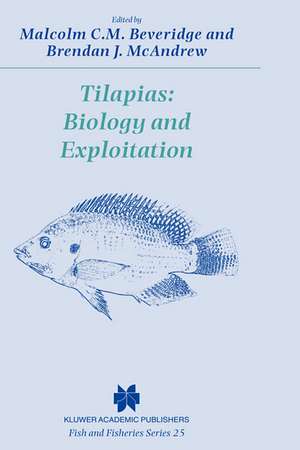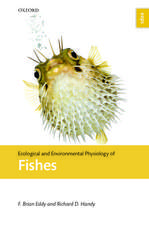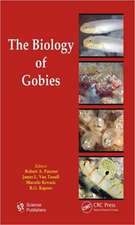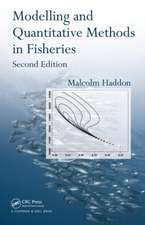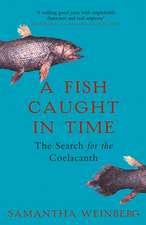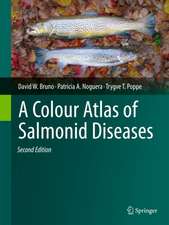Tilapias: Biology and Exploitation: Fish & Fisheries Series, cartea 25
Editat de M.C.M Beveridge, B. McAndrewen Limba Engleză Hardback – 31 aug 2000
This book attempts to pull together our knowledge of this important group - their biology and fisheries and aquaculture - in a single volume, something that has not been done comprehensively for nearly two decades. A succession of chapters by acknowledged authorities covers evolution, phylogenetic relationships and biogeography, reproductive biology, mating systems and parental care, diet, feeding and digestive physiology, environmental physiology and energetics, the role of tilapias in ecosystems, population dynamics and management, genetics, seed production, nutrition, farming, economics and marketing. The book is aimed at biologists, fisheries scientists, aquaculturists, and all interested in aquatic ecology.
| Toate formatele și edițiile | Preț | Express |
|---|---|---|
| Paperback (1) | 1227.84 lei 6-8 săpt. | |
| SPRINGER NETHERLANDS – 31 aug 2000 | 1227.84 lei 6-8 săpt. | |
| Hardback (1) | 1234.00 lei 6-8 săpt. | |
| SPRINGER NETHERLANDS – 31 aug 2000 | 1234.00 lei 6-8 săpt. |
Din seria Fish & Fisheries Series
- 18%
 Preț: 1116.09 lei
Preț: 1116.09 lei - 18%
 Preț: 978.12 lei
Preț: 978.12 lei - 18%
 Preț: 1242.66 lei
Preț: 1242.66 lei - 18%
 Preț: 1223.74 lei
Preț: 1223.74 lei - 18%
 Preț: 1224.85 lei
Preț: 1224.85 lei - 18%
 Preț: 942.76 lei
Preț: 942.76 lei - 18%
 Preț: 1233.06 lei
Preț: 1233.06 lei - 15%
 Preț: 647.40 lei
Preț: 647.40 lei - 18%
 Preț: 2490.41 lei
Preț: 2490.41 lei - 18%
 Preț: 1239.19 lei
Preț: 1239.19 lei - 24%
 Preț: 1301.42 lei
Preț: 1301.42 lei - 18%
 Preț: 2099.91 lei
Preț: 2099.91 lei - 15%
 Preț: 650.19 lei
Preț: 650.19 lei - 18%
 Preț: 1837.88 lei
Preț: 1837.88 lei - 18%
 Preț: 1227.21 lei
Preț: 1227.21 lei - 18%
 Preț: 1230.84 lei
Preț: 1230.84 lei - 18%
 Preț: 947.35 lei
Preț: 947.35 lei - 18%
 Preț: 961.86 lei
Preț: 961.86 lei - 18%
 Preț: 1226.11 lei
Preț: 1226.11 lei - 18%
 Preț: 1224.99 lei
Preț: 1224.99 lei - 18%
 Preț: 1234.00 lei
Preț: 1234.00 lei - 18%
 Preț: 1234.62 lei
Preț: 1234.62 lei - 15%
 Preț: 716.15 lei
Preț: 716.15 lei - 18%
 Preț: 1236.19 lei
Preț: 1236.19 lei - 18%
 Preț: 975.73 lei
Preț: 975.73 lei - 18%
 Preț: 1229.91 lei
Preț: 1229.91 lei - 18%
 Preț: 2325.45 lei
Preț: 2325.45 lei - 18%
 Preț: 995.34 lei
Preț: 995.34 lei - 18%
 Preț: 1233.20 lei
Preț: 1233.20 lei - 18%
 Preț: 1230.66 lei
Preț: 1230.66 lei
Preț: 1234.00 lei
Preț vechi: 1504.88 lei
-18% Nou
Puncte Express: 1851
Preț estimativ în valută:
236.20€ • 256.65$ • 198.54£
236.20€ • 256.65$ • 198.54£
Carte tipărită la comandă
Livrare economică 21 aprilie-05 mai
Preluare comenzi: 021 569.72.76
Specificații
ISBN-13: 9780412800900
ISBN-10: 041280090X
Pagini: 508
Ilustrații: XVI, 508 p.
Dimensiuni: 155 x 235 x 29 mm
Greutate: 0.91 kg
Ediția:2000
Editura: SPRINGER NETHERLANDS
Colecția Springer
Seria Fish & Fisheries Series
Locul publicării:Dordrecht, Netherlands
ISBN-10: 041280090X
Pagini: 508
Ilustrații: XVI, 508 p.
Dimensiuni: 155 x 235 x 29 mm
Greutate: 0.91 kg
Ediția:2000
Editura: SPRINGER NETHERLANDS
Colecția Springer
Seria Fish & Fisheries Series
Locul publicării:Dordrecht, Netherlands
Public țintă
ResearchCuprins
1 Evolution, phylogenetic relationships and biogeography.- 1.1 Definition of a tilapia.- 1.2 Evolution of the Cichlidae.- 1.3 Taxonomic classification.- 1.4 Evolution of mouthbrooding tilapia.- 1.5 Tilapiine evolution.- 1.6 Biogeography.- References.- 2 Reproductive biology, mating systems and parental care.- 2.1 Introduction.- 2.2 Mating systems and mate choice.- 2.3 Competition and territoriality.- 2.4 Courtship and spawning.- 2.5 Parental care.- 2.6 Habitat use during the life cycle.- 2.7 Breeding seasonality.- 2.8 Evolution of reproductive strategies.- 2.9 Implications for exploitation.- 2.10 Conclusions.- Acknowledgements.- References.- 3 Diet, feeding and digestive physiology.- 3.1 Introduction.- 3.2 Diet and feeding ecology.- 3.3 Food capture and processing.- 3.4 Gut morphology and digestion.- 3.5 Feeding rates and trophic efficiencies.- 3.6 Discussion.- Acknowledgements.- References.- 4 Environmental physiology and energetics.- 4.1 Introduction.- 4.2 Body design and general anatomical features.- 4.3 Handling and anaesthesia.- 4.4 Oxygen consumption and utilization.- 4.5 Nitrogenous excretion.- 4.6 The major metabolic modifiers.- 4.7 Energy flow and budgets.- 4.8 Effects of water quality parameters.- 4.9 Summary.- References.- 5 The role of tilapias in ecosystems.- 5.1 Introduction.- 5.2 Nilo-Sudanian tilapias in riverine ecosystems and impoundments.- 5.3 Nilo-Sudanian tilapias in lakes.- 5.4 Tilapias in Lake Victoria - the replacement of endemic by nilotic species.- 5.5 Nyumba ya Mungu reservoir, Tanzania, new home of O.esculentus.- 5.6 The roles of tilapias in species flocks.- 5.7 Tilapias in specialized ecosystems.- 5.8 O mossambicus in Lake Sibaya, southern Africa.- 5.9 The roles of tilapias established in ecosystems outside Africa.- 5.10 Discussion: the success of tilapias.- References.- 6 Population dynamics and management.- 6.1 Introduction.- 6.2 Population processes.- 6.3 Dynamics and management of populations.- 6.4 Life history variation and’ stunting’.- 6.5 Concluding remarks.- Acknowledgements.- References.- 7 Genetics for the management and improvement of cultured tilapias.- 7.1 Introduction.- 7.2 Choice of species and strains.- 7.3 Selective breeding.- 7.4 Chromosome set and ploidy manipulations.- 7.5 Control of reproduction.- 7.6 Transgenic tilapia.- 7.7 Summary.- References.- 8 Strategies for tilapia seed production.- 8.1 Introduction.- 8.2 Development of tilapia seed production.- 8.3 Factors affecting reproductive success and hatchery efficiency.- 8.4 Hatchery systems.- 8.5 Nursing of tilapia.- 8.6 Systems comparison.- 8.7 Summary.- Acknowledgements.- References.- 9 Nutritional requirements.- 9.1 Introduction.- 9.2 Protein requirements.- 9.3 Lipid.- 9.4 Carbohydrate.- 9.5 Protein and energy relationships.- 9.6 Vitamins.- 9.7 Minerals.- Conclusions.- References.- 10 Semi-intensive pond aquaculture.- 10.1 Introduction.- 10.2 Comparison of tilapias and carps.- 10.3 Culture systems.- 10.4 Pond fertilization.- 10.5 Supplementary feeding.- 10.6 Environmental concerns.- References.- 11 Production in intensive and recycle systems.- 11.1 Introduction.- 11.2 The suitability of tilapia for intensive production.- 11.3 System design and operation — theoretical and practical aspects.- 11.4 Practical development of intensive and recycle systems.- 11.5 Problems and constraints.- 11.6 Future directions.- References.- 12 Economics and marketing.- 12.1 Introduction.- 12.2 The tilapia marketing environment.- 12.3 Current supply features.- 12.4 Comparative production economics.- 12.5 The market for tilapia products.- 12.6Prospective tilapia consumers.- 12.7 Marketing tilapia in the EU.- 12.8 Marketing tilapia in North America.- 12.9 Challenges for tilapia marketing.- 12.10 Potential directions and conclusions.- References.- Species index.
Recenzii
`Given the importance of tilapias globally to ecosystems and human food production, this book is a highly recommended addition to the library of any researcher working with this species.'
The quarterly review of Biology, 76
The quarterly review of Biology, 76
